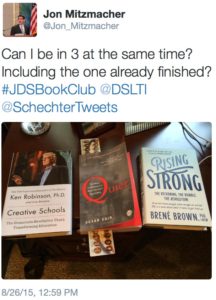Preamble…
For three years, during my time at Schechter and at Prizmah, when I was not a head of school, it seemed so easy calling on folk to take seriously the responsibility and the power of blogging. Now that I have been back in the headship for all of seven weeks, I can’t imagine when I will ever have time to blog again! I know what kind of person people say Karma is, but s/he should really meet my good friend Hubris.
Getting back into weekly blogging, apparently, is harder to do than it is to type, but slowly, slowly, I will get back into shape. In the meanwhile…
THERE IS SO MUCH HAPPENING AT OJCS AS WE GET READY TO WELCOME TEACHERS NEXT WEEK AND STUDENTS THE WEEK AFTER!
If you are a parent, I strongly encourage you to read carefully the email from this past Monday and the handbook it came with. If you have any questions or concerns, I even more strongly encourage you to email or call us sooner than later. We really want the first day of school to be as smooth and celebratory as possible. Let’s deal with any confusion or preparation beforehand for all our collective sakes. Also, remember (or know) that we have “Back to School” Night super-early this year – September 14th – so you will have ample opportunity to ask additional or deeper questions about the calendar, schedule, program, discipline, homework, curriculum, Google Classroom (hint, hint), etc., sooner than later. You don’t have to stress about each detail by the first day of school – let’s focus on a positive, enthusiastic, ruach-filled beginning to a terrific year. The conversation begins on the first day, it never ends.
Pivot…
Finding the problem is an essential part of learning – one that students miss out on when we pose the problem to them first. – Ewan McIntosh
The ability to ask the right question is more than half the battle of finding the answer. – Thomas J. Watson, the founder of IBM
You might think from the above quotes that I am going to launch into an educational conversation about teachers and students and learning. And perhaps in a future blog post I will – there is much wisdom to apply to shifting paradigms, flipping classrooms, student-centering and passion-driving in our classrooms. But in this year of change, I actually want to zoom out a bit and ask us to consider how creating a healthy culture of “problem finding” will ensure we engage in the right kinds of conversations to move our school forward into its next phase of growth, innovation and renewal.
I have spent much of the last few weeks meeting with teachers, parents, board members, rabbis, donors, Jewish community colleagues, volunteers and just folks who care enough to share an opinion (which I genuinely appreciate). Those conversations often feel (to me) like the process of pulling back the leaves of a never-ending onion (which kinda sounds delicious). One layer takes us to another as we peel away initiatives, programs, schedules, budgets, and eventually assumptions just trying to figure out what that layer was originally put into achieve. In other words, we frequently seem to be offering a chain of solutions in search of the right problem.
Let me try to walk through one relatively benign example that impacts such a small number of our students, you may not even be aware it exists…
We offer a pull-out, one-period-a-week, mixed grade (3-6), “Special Interest Learning” (SIL) class for “gifted learners”. It provides them an “opportunity to be creative, innovative, (and) think critically”. [BTW – I am not offering an opinion or making a decision about SIL. It just lends itself to this conversation.]
How many questions does this raise?
Why one-period-a-week? Which period? Why those grades (in a K-5 & 6-8 school)? What interests? Don’t all our students deserve an opportunity to be “creative, innovative…” and to think critically?
What problem was SIL in search of solving? What problem does it actually solve? What problems does it unintentionally create?
Etc.
Again, that is a benign example. There are critical and more highly charged examples whose examinations are overdue.
What problem is our voluntary, middle school “Orthodox” and “Traditional Egalitarian” minyanim trying to solve?
What problem is Core and Extended Hebrew trying to solve?
What problem is Extended French trying to solve?
What problem does OJCS exist to solve?
You get it.
As we prepare to welcome back our teachers next week (the subject of next week’s blog), I am encouraging and inviting us to find the right problems…
Let’s be brave enough to ask questions we might not know the answers to or whose answers we might not like. Let’s be open enough to revisit our core assumptions and proud enough to assert what’s currently excellent. Let’s have the courage to show up for difficult conversations and the vulnerability to really show up. Let’s take risks and make mistakes. Let’s dream boldly and work tirelessly. Let’s advocate for our children and respect our teachers. Let’s make this the beginning of something special.
One thing I know for sure. The future of education isn’t coming to OJCS. It is OJCS. Be excited.





 I’ll have much more to say in the weeks and months ahead about the work, the school, and the move. We are neck-deep in emigration law and relocation logistics. I appreciate all the unintentional political jokes moving to Canada provides at this unique moment in time. I know it will be cold.
I’ll have much more to say in the weeks and months ahead about the work, the school, and the move. We are neck-deep in emigration law and relocation logistics. I appreciate all the unintentional political jokes moving to Canada provides at this unique moment in time. I know it will be cold.




